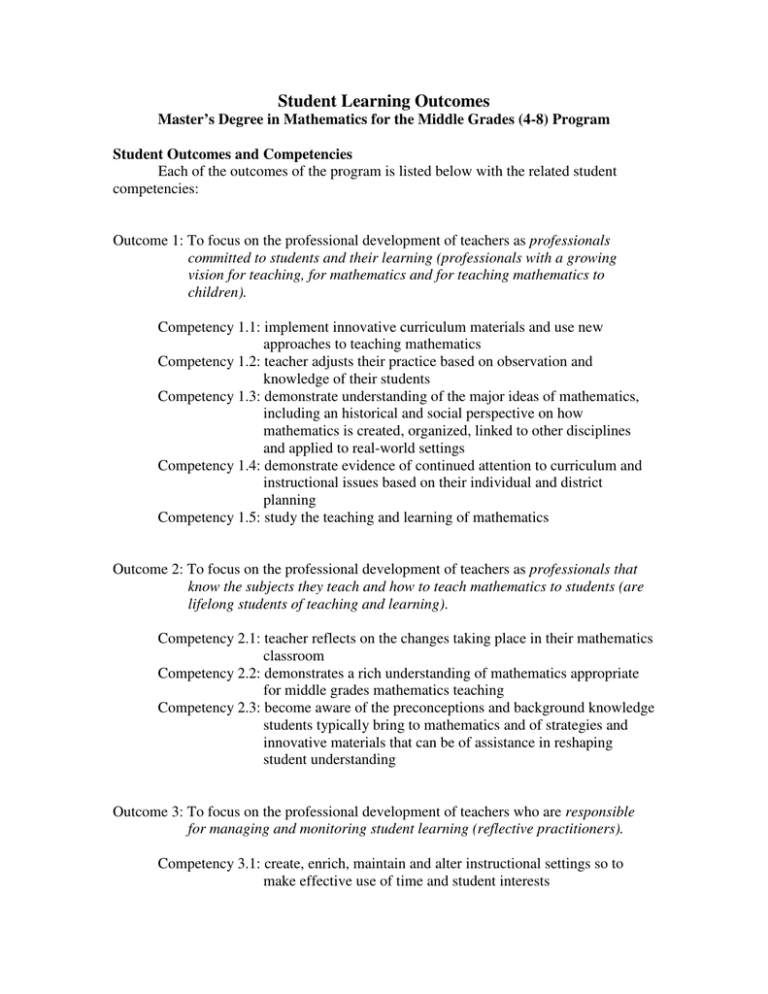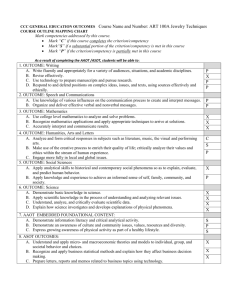Student Learning Outcomes
advertisement

Student Learning Outcomes Master’s Degree in Mathematics for the Middle Grades (4-8) Program Student Outcomes and Competencies Each of the outcomes of the program is listed below with the related student competencies: Outcome 1: To focus on the professional development of teachers as professionals committed to students and their learning (professionals with a growing vision for teaching, for mathematics and for teaching mathematics to children). Competency 1.1: implement innovative curriculum materials and use new approaches to teaching mathematics Competency 1.2: teacher adjusts their practice based on observation and knowledge of their students Competency 1.3: demonstrate understanding of the major ideas of mathematics, including an historical and social perspective on how mathematics is created, organized, linked to other disciplines and applied to real-world settings Competency 1.4: demonstrate evidence of continued attention to curriculum and instructional issues based on their individual and district planning Competency 1.5: study the teaching and learning of mathematics Outcome 2: To focus on the professional development of teachers as professionals that know the subjects they teach and how to teach mathematics to students (are lifelong students of teaching and learning). Competency 2.1: teacher reflects on the changes taking place in their mathematics classroom Competency 2.2: demonstrates a rich understanding of mathematics appropriate for middle grades mathematics teaching Competency 2.3: become aware of the preconceptions and background knowledge students typically bring to mathematics and of strategies and innovative materials that can be of assistance in reshaping student understanding Outcome 3: To focus on the professional development of teachers who are responsible for managing and monitoring student learning (reflective practitioners). Competency 3.1: create, enrich, maintain and alter instructional settings so to make effective use of time and student interests Competency 3.2: become adept at engaging students and adults to assist in their teaching and at enlisting members of the faculty and their cohorts’ knowledge and expertise to complement their own Competency 3.3: engage groups of students to ensure a disciplined learning environment and how to organize instruction that aids in the establishment of setting norms for social interaction Outcome 4: To focus on the professional development of teachers so that teachers think systematically about their practice and learn from experience. Competency 4.1: aid their students in the ability to reason and take multiple perspectives to be creative and take risks, and to adopt an experimental and problem-solving orientation Competency 4.2: draw on knowledge of human development, subject matter and instruction and their understanding of their students to make principled judgments about sound practice Competency 4.3: strive to strengthen their teaching, critically examine their practice and adapt their teaching to new findings, ideas and theories Outcome 5: To focus on the professional development of teachers as members of a learning community (leaders and contributors to mathematics education). Competency 5.1: demonstrate knowledge about current issues related to mathematics curriculum and instruction Competency 5.2: demonstrate understanding of the National Council of Teachers of Mathematics (NCTM) vision of mathematics curriculum, instruction, and assessment as described in the NCTM Standards Competency 5.3: assume leadership roles for mathematics curriculum and instruction in their district and/or AEA Competency 5.4: share ideas and expertise by speaking at conferences, presenting workshops and promoting reform in mathematics classrooms Competency 5.5: become an active participant in professional organizations related to teaching mathematics



